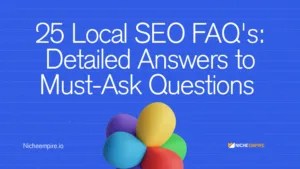Are you tired of your business being overlooked by nearby customers searching online? Ranking above your local competitors isn’t easy since you will compete with hundreds of businesses for the top ten ranking positions.
Think With Google reported that 76% of online searchers who search for “near me” contact a business within a day; this local SEO statistic shows the importance of local SEO for small businesses.
Our comprehensive local SEO checklist is designed to help your brand dominate local search results, gain visibility, drive traffic, and increase your leads from local SEO.
Here’s a recap of our local SEO checklist
- Use Google Questions And Answer
- Testimonials and review
- Establish a solid online presence
- Analyse and monitor your local SEO performance
- Make use of keywords related to your local business
- Create and optimize Google Business Profile
- Get involved in quality local link building
- Fix technical seo issues
- Go for relevant local citations
- Include schema markup
- Optimize internal linking – On-page SEO strategy
- Ensure your website is mobile-friendly
- Create relevant web content containing local keywords
- Optimize websites and brand pages
- Make use of high-quality local directories for local ranking
What is Local SEO?
Local Seo is the process of implementing essential SEO strategies that make brands visible to nearby customers searching for their products or services online.
Below is the comprehensive checklist for improving your local SEO and becoming more visible to people in your locality.
Analyze and Monitor Your Local SEO Performance
This is believed to be the first thing to do. You need to analyze your website or brand’s local SEO performance. This allows you to use the data to fine-tune and improve your SEO strategy. It will also help you compare your initial results and those you will obtain later for growth and areas that need improvement.
You can use tracking tools like Google Console and Google Analytics to monitor and analyze your SEO performance.
Google Search Console (GSC)
This is a free tool for monitoring and improving a site’s performance on Google search results. It is designed to help business owners, webmasters, and digital experts optimize content, monitor site performance, and fix technical SEO issues.
GSC is also an excellent tool for checking Google penalties and optimizing SEO strategies. It is a must-have for local SEO campaigns.
Benefits of Google Search Console:
- GSC helps business owners understand their target audience’s needs, preferences, and behavior.
- Insights from GSC help businesses enhance user experience through things such as page speed.
- GSC insights can help you improve your local target keyword’s search engine rankings.

Google Analytics
This is Google’s web analytics service, which helps marketers and business owners scrutinize the behavior of visitors to their websites. The tool also presents engagement, traffic, and conversion data, enabling business owners to fine-tune their marketing strategies and improve their presence in search results.
Use traffic analytics to find out the volume of non-paid traffic coming to your website from local sources.
Make Use of Local Keywords Related To Your Local Business
To attract the right customers, you must include local keywords related to your business that people are searching for. Doing keyword research using the wrong terms without connection to your local business would not yield a positive SEO result.
For your keyword research, you can use search terms your potential customers will likely search for on Google. For instance, if you are a professional baker, it is recommended to use keywords such as “baker in (your service areas), baker near (locations you serve), baking service in (your target cities)” on your website.
Here are some key points to consider:
Use Base Keywords
It is advisable to use base keywords (also known as seed words). Base keywords typically serve as the basis for more extensive keyword research. They are usually relevant, have a high search volume, and help generate more keyword ideas.
Examples of base words are:
- Baking tips
- Baking equipments
- Baking materials
- Baking shops
- Baker in (city)
Make Use of Keyword Research Tools
Keyword research tools help analyze search terms related to your business. They also give you insight into how many people search for those search terms in a month, the difficulty of such keywords’ ranking potential, and more. Niche Empire can help you with keyword research processes.
Your Local Landing Pages Should Contain Your Target Local Keywords
Your home page should fundamentally reflect a group of keywords related to your business. This strategy will help you optimize your website for your target keywords.
Learn more about SEO Location Landing Page
Create and Optimize Google Business Profile (GBP)
Google Business Profile is a free tool designed by Google for business owners that allows them to determine and organize how their business shows up on Google Maps, Shopping, and Local Search. Any local SEO checklist would be incomplete without a mention of Google Business Profile. This is because GBP is an integral part of local SEO for Small Businesses.
When setting up your Google business profile, your business can rank higher when you supply more information to Google. Google typically asks for your business’s name, location, website, opening hours, and phone number.
Watch this tutorial to learn more about GBP optimization.

Google Business Profile Best Practices
- Try to raise your business listing score to 100%. This can be achieved by accurately providing all the required information and optimizing your business page.
- When writing a description of your product or service, include your target keywords and the services you offer.
- Ensure your website URL, address, phone number, and brand name are accurate (NAPW). Inaccuracy in these details can reduce the consistency of your business information, which is crucial in local SEO.
- Acquire more reviews and respond to reviews on your profile. It is another way to gain the trust of Google and your prospective customers.
- To enhance your local listing, upload images and videos of your business in GBP. This will promote engagement and conversion. Again, it gives potential customers a visual representation of how you run your business.
- Update your business regularly with information about events and promotions your brand offers. This will increase your brand’s online activity.
- Keep an eye on your profile’s performance. Ensure to optimize it from time to time.
Get Involved in Quality Local Link Building
Link building is the process of earning links from other websites. The quality and quantity of links websites obtain from other sites determine their ranking on Google. The better the quality, the better the ranking.
Links are like a “vote of confidence”; they signify to search engines that your website is credible, relevant, valuable, authoritative, and has a good reputation. Backlinks are essential in local SEO because they increase your search engine rankings.
Backlink practices to consider for local ranking include:
Create Content That Resonates With Locals
You can up your link-building game by writing posts that align with your locality’s activities. By this, we mean posts that locals within your location can find helpful and relevant.
For instance, as a baker in Texas, you can create a blog post titled “Top 10 Baking Competitions to Attend in Texas. ” Writing such posts could earn your website many links if bloggers within your region.
Work Together With Local Businesses
As a baker, you can partner with local baking shops or coffee shops in your region. The collaboration aims to promote each other’s businesses, products, offers, events, and services. Both brands can obtain links and earn mentions in blog posts.
Promote Local Events or Charity Causes
You could earn backlinks from the websites of charity organizations or bodies organizing local events when you sponsor any of their events. This can be achieved when they mention and link to your website in their content or promotional writeups.
Guest Blogging
This strategy entails contributing to someone’s website, blog, or platform as a guest writer. By writing and publishing guest posts on the person’s website, you connect with them and their audience and earn backlinks.
Guest blogging allows business owners to maximize networking and establish their brands as an authority.
Fix Technical SEO Issues
Technical SEO involves optimizing the technical aspects of a website for better indexing, crawlability, and visibility in local searches. It is a major ranking factor as it covers vital elements of a website, such as:
- Page speed
- XML sitemaps
- Website structure
- Mobile-friendliness
- SSL encryption
- Structured data
- 301 Redirects
- Website architecture etc

Go for Relevant Local Citations
Local citations occur when the brand’s name, address, phone number, and website (NAPW) are mentioned on another platform or website. Sometimes, other business information, such as the brand’s hours of operation and categories, is included in local citations.
Citation is an essential local SEO strategy because it helps attract local customers, build trust among locals, solidify credibility, and increase your brand’s local visibility.
For your business to enjoy citations, you must ensure that your NAPW does not vary across platforms; it must be consistent and unique. Inconsistency could lead to distrust of your business name.
Again, you’ll need to seek quality citations, regularly cross-check and update your business information on such platforms or websites, and try to include links to your websites in local citations.
Here are a handful of local citation sources you could leverage to build your brand’s citation:
- Google My Business
- Bing
- Yelp (renowned for being the go-to site for business reviews and discovery).
- Associations of local businesses
- Apple Maps
- Yellow Pages
- SurePages
Read More: Localization SEO Tips
Include Schema Markup
Schema markup, or structured data, is a unique code that explicitly helps search engines understand your content and how to present it to users. You should add schema markups to your web pages to help search engines understand your content and show rich results about your business when applicable.
The inclusion of schema markups helps search engines to show online users additional information about your business, such as:
- Ratings
- Reviews
- Schedules
- Description
- Products and services
- Events
- Phone number and location
- Recipe etc
Structured data can also help your web page appear in Google’s knowledge panel and rich cards.
To add schema markup to your website, you can use either of the following:
- JSON-LD (JavaScript Object Notation for Linked Data): Commonly used than RDFa and Microdata
- Google Structured Data Markup Helper (for generating schema markup code)
Schema Markup Best Practices:
- You can consider using LocalBusiness schema markup type if you have a local business. This helps enhance the knowledge graph of your business and its web properties and services.
- Adding structured data can be tiring when you have no idea what you’re doing. For help navigating, check out Google’s structured data guidelines.
- If your business is service-oriented, you can use the “LocalBusiness” schema nested with the “Service” schema markup type to clearly state the services your brand offers users and where they can find you.
- Lastly, use a schema markup validator to test and validate that your code is functional.
Optimize Internal Linking – On-page SEO Strategy
Internal linking is a fundamental on-page SEO optimization strategy. It involves linking your business web pages from one to another on your website, making it easy for search engines to understand your website’s hierarchy and structure. It also helps users navigate your website easily.
Crawling and indexing a website is easier once search engines understand its hierarchy and structure. Linking valuable pages on your website will go a long way toward helping online users and search engines find information on it.
Internal Linking Tips to Consider:
- Link to web pages that are only relevant to your content.
- Avoid linking pages that cannot provide useful or additional information to the user.
- Do not over-link.
- The linked page should have a concise anchor text.

Other On-page SEO strategies to implement:
- Write a compelling title containing your local keyword
- Optimize your permalink URL
- Do not stuff your local keywords on your web pages
- Make use of a unique target keyword per page
- Keywords must be reflected in your title tag, H1, and body content
- Use H2s-H4s for subheadings and include your target keyword when relevant
- Optimize your images with ALT text
Ensure Your Website is Mobile-Friendly
Mobile-friendly website enhances local SEO. First, Google considers mobile-friendly pages more than desktop pages in local searches.
The importance of having a mobile-friendly website cannot be overemphasized. Some of them are:
- A mobile-friendly website minimizes bounce rates to an impressive degree
- It enhances a smooth and consistent user experience.
- When a website is mobile-friendly, the conversation chances are high because users will be glued to their mobile devices for long.
Again, a significant volume of searches is done on mobile devices, so optimising your website for mobile users is imperative.
More Ultimate Local SEO Checklist to Implement
Create Relevant Web Content Containing Local Keywords
Craft relevant and in-depth posts on subjects that people in your region search for online.
For example you could create content about:
- Affordable Air Duct Cleaning in [City Name]: A Complete Guide
- The Ultimate Guide to Buying a Home in [City Name]
- The Best Vegan and Vegetarian Restaurants in [City Name]
- The Best Gyms Near Me in [City Name]
- Top Auto Repair Shops in [City Name]
- The Best Day Spas for Relaxation in [City Name]
- How to Find the Best Personal Injury Lawyer in [City Name]
- The Best Roofing Contractors in [City Name]
- Top-Rated Pediatricians Near Me in [City Name]
- Top Local Boutiques in [City Name] for Unique Finds
You must infuse the local keywords into web content or meta descriptions to optimize for local SEO.
Creating GEO-specific blog posts is one way to drive local traffic to your website and become visible on local result pages. Doing so establishes your brand as an authority in your local industry.
Besides blog posts, you can use other formats of content to drive traffic, such as:
- Videos (vlogs, explainer videos)
- E-books (in-depth guides)
- Podcasts (panel discussions and interviews)
- Infographics (statistics)
Local SEO Content Best Practices
Below are SEO best practices to follow when creating local SEO content:
- Understand your target audience and address their pain point
- Use concise paragraphs and scroll-stopping headlines
- Include your NAPW (Name, Address, Phone and Website) when applicable
- Embed your Google Business Profile map on relevant service pages on your website
- Employ storytelling techniques: stories about your brand, customer success, and whatnot
Read More: Squarespace SEO Checklist
Optimize Website And Brand Pages
It is not enough to have location landing pages; you also need to impress local customers with brand pages on your website. Here are the pages you need to add or optimize to enhance your local SEO strategy.
About page
Your brand or website must have an ‘About Page’ that contains detailed information about your business, its mission, founders, history, and vision statement.
Contact Page
Every business or website needs a contact page where customers can easily find contact details, addresses, phone numbers, and channels for inquiries, questions, or clarifications.
Team Page
Local businesses are encouraged to dedicate a page to the members of their teams. The page should contain their short bio and probably achievements. Doing this will help build trust and enhance organizational reputation.
Make Use of High-quality Local Directories for Ranking
Another strategy to include in your local SEO checklist is submitting your website to quality local SEO directories to improve your ranking in SERPs. Google indexes the directory entries, and if it finds the directory relevant and high-quality, it can place the website in an enviable spot on the search result page.
This approach can increase your visibility even if you struggle with ranking since visibility is from other sites. Using high-quality local directories will also allow other businesses in the entries to notice you. It is another way of getting backlinks.
Local directories best practices:
- Be consistent in your details. Inconsistency in your details could lead potential customers to question the authenticity of your business.
- Keep an eye on your details and update them when necessary.
Request for Testimonials and Reviews
Testimonials and reviews help build a business’s credibility. Both positive and negative reviews help shape a brand—the positive ones help build a business’s reputation, while the negative ones help identify areas for improvement and satisfy user experience.
Reviews and testimonials form part of a great local SEO checklist. They improve your Google Business Profile rankings and increase the chance of would-be customers hiring your company. Businesses with impressive Google reviews stand out from others online.
The more the reviews, the higher your chances of ranking in local searches.
Consider these tips for online reviews and testimonials:
- Always encourage satisfied customers to leave a review and ratings on your Google Business Profile
- Respond to both good and bad reviews in your Google Business Profile
- Encourage your customers to keep reviews factual and fact-based.
Reviews and testimonials in Local SEO are crucial strategies that will help your marketing plan. They help build trust, generate local leads, and increase traffic and conversions.
Leverage Social Media Platforms
To maximize local SEO, you must establish a strong online presence across social media platforms. Google focuses on ranking brands, so it’s crucial to identify the platform (s) where your target audience is and become active there. Being active on social media helps you create awareness and solidify your brand for sustained search rankings.
Again, it allows you to meet and reach new potential customers in your locality. Establishing a strong social media presence also helps you to bond or connect with your customers. It is an excellent channel to preach your brand’s persona and stories.
Social Media Tips to Consider for Local SEO:
- Remember to tag your location and business in local events you participate in.
- Apart from business posts, share educative and valuable content with your customers. This strategy increases the Know-Like-Trust (K-L-T) factor of your business.
- Respond to their questions, comments, and feedback.
- Try to establish authority, relevance, and reputation on the platforms.
More Facts on Our Complete Local SEO Checklist
Use Google’s Questions And Answers
Google’s Question And Answer is a feature in the Google Business Profile (GBP) that allows business owners to engage with their customers. The elements enable users to ask and answer questions about a brand directly on a GBP listing.
Google’s Q&A forms an integral part of the local SEO checklist. It allows user and business engagement and helps business owners rank higher on result pages. Google presents users with information from the Question And Answer feature as extra relevant information when inquiries are made about a business.

How to Optimize Google’s Questions and Answer Feature:
- Use your locally targeted keywords
- Respond to questions in a friendly manner
- Ensure to review and update your answers to maintain relevance online
- Avoid irrelevant and unnecessary words. Go straight to the point when using the feature.
When planning digital marketing campaigns for your business, tick all our local SEO checklist boxes.
Recommended: Hyper Local SEO – Beginners Guide
Conclusion
Local SEO is crucial for small business owners and websites wanting to dominate their local business sphere on search results. We explored over ten strategies to implement to master local SEO. Carefully read through them and start implementing as we hope you succeed in your SEO game.
Kindly share this article if you found it helpful.
Frequently Asked Questions
What Does Local SEO Consist Of?
Local SEO consists of these and more:
- Keyword research
- On-Page SEO
- Google My Business (GMB) Optimization
- Local schema markup
- Optimized website content
- Local listing
- Testimonials, reviews, and ratings
- Technical SEO (mobile-friendliness, page speed, etc.)
- Local Link Building
- Local engagement or activities
- Local citations.
- Tracking and Analysis
How Do You Find These Local Citations?
You can find local citations using search engine result pages. Major players here are Bing, Yelp, Google, and Apple. You can also use data aggregators to find local citations. The predominant data aggregators in the United States are Neustar Localeze, Express Update, and Factual.
Lastly, you can find local citations on unstructured platforms such as news articles, online platforms, and blog posts. You can reverse-engineer your competitor’s citations by searching their “Brand Name + Phone Number” on Google to see places they were listed so you can list your company there, too.
What is Google Local Pack?
Google Local Pack is a feature on Google Search that displays a list of relevant businesses related to a local online search. It is also called Local 3-Pack, Map Snack Pack, Google 3-Pack, or Local Pack.
It mainly comprises local business listings on search results.
What Does a Local SEO Specialist Do?
An SEO specialist is responsible for optimizing a local website to drive traffic, gain visibility, generate leads, increase conversions, and improve the overall functionality of a local business.
Here are some of the things he does to achieve this:
- Responds to customers’ reviews.
- Shares testimonials and ratings
- Finds and builds local citations for the business
- Improves website content and titles with locally targeted keywords
- Conducts keyword research and optimization
- Technical SEO
- Maintains NAP consistency across platforms
- Monitors local search conversation rates, traffic, and rankings
- Researches and builds high-quality local citations
- Obtains local backlinks
- Monitors local SEO using local SEO tools
- Know about the latest local SEO best practices
Is Doing A Local SEO Worth It?
Yes, local SEO is worth it.
- Local SEO boosts online visibility on search results.
- It guarantees higher conversion rates, all things being equal
- It gives businesses an edge over competitors who don’t implement local SEO
- Local SEO helps companies reach their target customers
- It provides measurable results which help businesses to track their performance
Why is Local SEO Important?
Local SEO is essential because it puts businesses before potential customers. It makes a company stand out and increases its chances of selling to local buyers.



